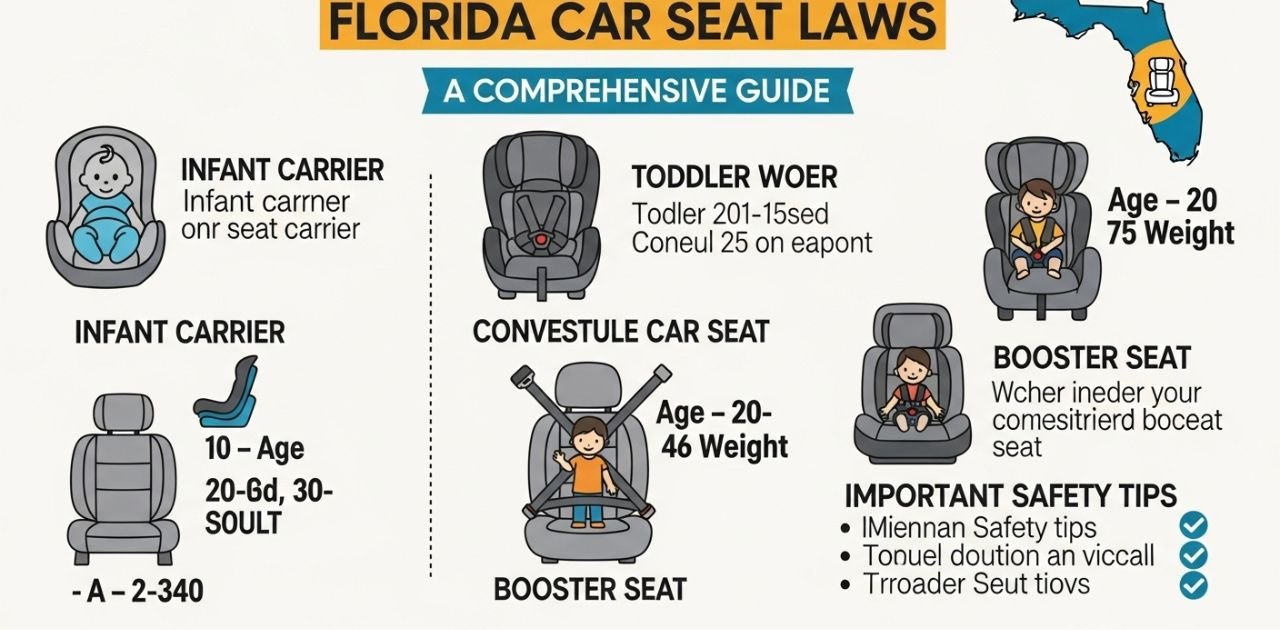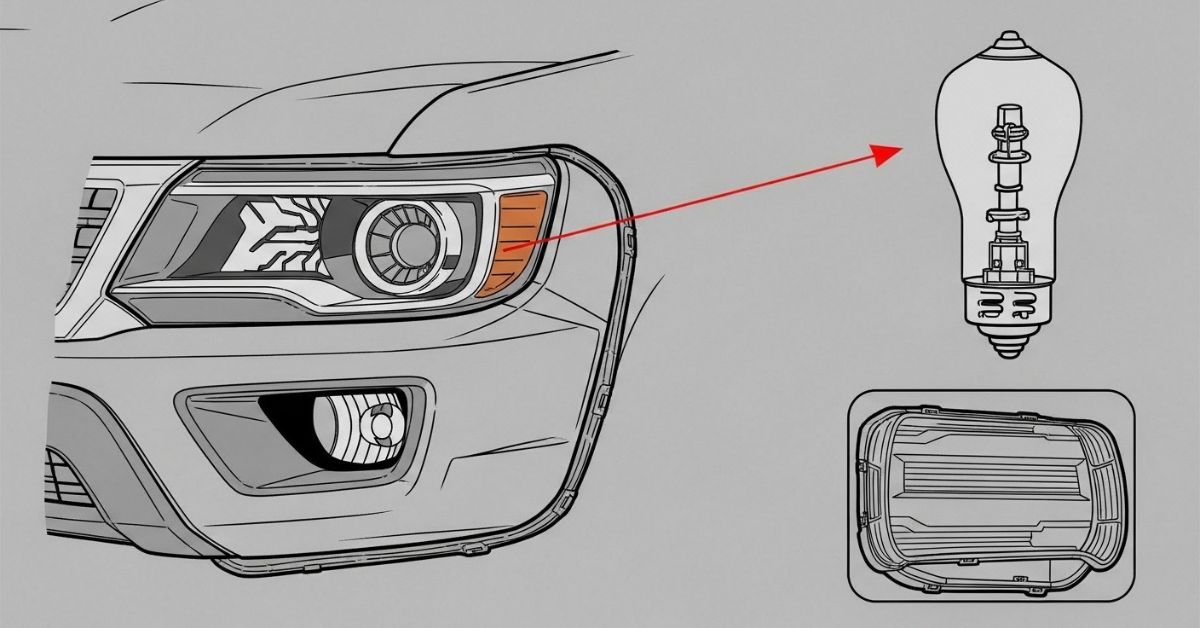Contents
- 1 Introduction to Florida Car Seat Laws
- 2 Understanding the Different Types of Car Seats
- 3 Age and Height Requirements for Car Seats in Florida
- 4 Exceptions to the Law
- 5 Consequences of Not Following Florida Car Seat Laws
- 6 Tips for Properly Installing a Car Seat
- 7 Frequently Asked Questions about Florida Car Seat Laws
- 8 Conclusion: Keeping Your Child Safe on the Road
Introduction to Florida Car Seat Laws
When it comes to keeping our little ones safe on the road, understanding car seat laws is crucial. Florida has specific regulations designed to protect children while traveling in vehicles, but navigating these rules can be overwhelming for many parents. Whether you’re a new parent or just looking for a refresher on the latest requirements, this comprehensive guide will cover everything you need to know about Florida car seat laws. From the types of seats required based on age and size to tips on proper installation, we’ve got you covered. Buckle up as we dive into the details that matter most for your child’s safety!
Understanding the Different Types of Car Seats
Choosing the right car seat is crucial for your child’s safety. There are three main types of car seats: rear-facing, forward-facing, and booster seats.
Rear-facing car seats are ideal for infants and toddlers. They provide essential support to a young child’s head, neck, and spine during a crash. Most experts recommend keeping children in this position until they reach the maximum weight or height limit specified by the manufacturer.
Forward-facing seats cater to older toddlers who have outgrown their rear-facing models. These often come with harness systems that offer extra security as your child grows.
Once kids surpass the limits of front-facing seats, it’s time for booster seats. These help position regular seat belts correctly across a child’s body for optimal protection.
Understanding these options ensures you select what’s best suited for your child at every growth stage.
Age and Height Requirements for Car Seats in Florida
Florida has specific age and height requirements for car seats to ensure children’s safety while traveling.
For infants, a rear-facing car seat is mandatory until they reach at least 1 year old and weigh a minimum of 20 pounds. This position provides the best protection for their developing bodies.
Once children outgrow the infant seat, they should transition to a forward-facing car seat with a harness. They can remain in this type of seat until they are 4 years old or reach the manufacturer’s weight limit.
After surpassing these benchmarks, kids must use booster seats until they’re around 8 years old or have reached a height of 4 feet 9 inches.
These regulations help reduce injury risk during accidents by ensuring that restraints fit properly as children grow. Keeping up with these guidelines is crucial for every parent or guardian on Florida roads.
Exceptions to the Law
Florida car seat laws have specific exceptions that can be crucial for parents to know. For example, children with medical conditions may use alternative devices as prescribed by a physician.
Additionally, some vehicles might not be equipped to accommodate traditional car seats. If you’re driving a taxi or rideshare service and your child is in the backseat without a proper seat, there are different guidelines at play.
If a child is over the age of 6 and meets certain height requirements, they can transition out of booster seats. However, safety experts recommend keeping them in boosted protection as long as possible.
These exceptions don’t mean skipping safety measures; they highlight flexibility within regulations designed to protect kids on the road. Understanding these nuances helps ensure every journey remains safe for young passengers.
Consequences of Not Following Florida Car Seat Laws
Ignoring Florida car seat laws can lead to serious consequences. Fines are the most immediate penalty, with violations costing parents up to $60.
However, penalties don’t stop there. A record of non-compliance can also affect your insurance premiums. Insurers may consider it a risk factor, leading to increased rates.
More importantly, not adhering to these laws puts children at significant risk during accidents. Properly secured children are far less likely to suffer severe injuries or fatalities in crashes.
Law enforcement officers have the authority to issue citations on the spot if they observe improper use of car seats or seat belts. This could mean an unwanted interaction for families already under stress.
Neglecting these regulations not only affects your wallet but jeopardizes your child’s safety and well-being while traveling on Florida roads.
Tips for Properly Installing a Car Seat
Installing a car seat can feel daunting, but it doesn’t have to be. Start by reading the manufacturer’s instructions carefully. Each seat may have different requirements.
Make sure the car seat is appropriate for your child’s age and size. The harness should be snug against their body but not too tight that it causes discomfort.
Position the car seat in the backseat of your vehicle. This area is generally safer for young children compared to the front passenger side.
Use either lower anchors or a seat belt for installation, depending on what your vehicle allows. Ensure you pull any straps tightly and check for movement after securing everything.
Take time to familiarize yourself with local resources, like certified technicians who can help verify your installation if you’re unsure. It’s always better to ask than guess when it comes to safety!
Frequently Asked Questions about Florida Car Seat Laws
Many parents have questions about Florida’s car seat laws.
One common inquiry is whether a child can sit in the front seat. The law recommends keeping children under 13 years old in the backseat for safety reasons.
Another frequent question concerns booster seats. Children who outgrow harnessed car seats should transition to booster seats until they reach 4’9″ tall, regardless of age.
Parents often wonder about fines related to violations. Fines can vary, but safety is always more important than costs associated with tickets.
Some ask where to find resources for proper installation. Local fire departments and hospitals frequently offer free inspection services to ensure everything is set up correctly.
Staying informed helps keep your little ones safe on the road.
Conclusion: Keeping Your Child Safe on the Road
Keeping your child safe on the road is a top priority for every parent. Understanding Florida’s car seat laws is essential in ensuring that your little ones are properly secured while traveling. With various types of car seats available, it’s important to choose one that fits both your child’s age and size.
Always stay informed about the latest regulations and make adjustments as your child grows. Remember, exceptions do exist, but safety should always come first. Not adhering to these laws can lead to serious consequences, including fines and increased risk of injury during an accident.
Proper installation of a car seat cannot be overlooked either. Take the time to read manuals and seek help if needed; many local organizations offer assistance for parents unsure about installation techniques.
By prioritizing education around Florida’s car seat laws, you contribute significantly to safer roads for everyone. Your diligence not only protects your own children but also promotes overall community awareness regarding child safety while traveling.




